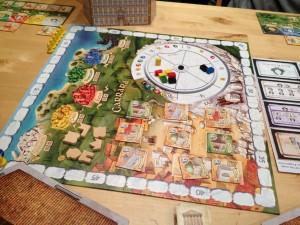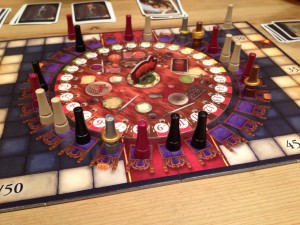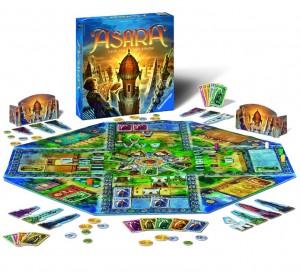Posted by James (admin) on 13th June 2013
 The Palaces of Carrara first caught my attention because it’s a Eurogame by veterans Wolfgang Kramer and Michael Kiesling (Tikal, Tikal II, Asara). Also, the Palaces of Carrara has been nominated for the 2013 Spiel des Jahres Kennerspiel.
The Palaces of Carrara first caught my attention because it’s a Eurogame by veterans Wolfgang Kramer and Michael Kiesling (Tikal, Tikal II, Asara). Also, the Palaces of Carrara has been nominated for the 2013 Spiel des Jahres Kennerspiel.
Players buy coloured marble which they use to build buildings in the 6 cities. The player with the most victory points (VPs) at the end of the game is the winner. This may sound very ordinary, but there are several clever game mechanics that combine really well and deliver a tight and tense game.
On their turn, a player can either buy marble, build a building, or score.
Buying Marble
On the board is a rotating disc (split into 6 segments). Around the disc are 6 sets of prices for the different marble colours – white is most expensive, then yellow, then red, and so on. When buying marble, the player turns the wheel one section clockwise and draws marble blocks from the bag to bring the total on the wheel up to 11 (placing new blocks in the most expensive segment). The player can then buy any number of marble blocks but only from one single segment of the wheel. The costs are marked next to each segment and these get cheaper (even free) as blocks progress around the wheel. Read the rest of this entry »
Tags: Asara, board game news, Board Games, board gaming, Hans im Glück, Michael Kiesling, SdJ, Spiel des Jahres, The Palaces of Carrara, Tikal, Tikal II, Wolfgang Kramer, Z-Man Games
Posted in Board Game Review, Board Games, The Palaces of Carrara | No Comments »
Posted by James (admin) on 12th September 2012
 Artus is a game about King Arthur and the round table designed by Michael Kiesling and Wolfgang Kramer (the creators of great games such as Tikal, Tikal II and Asara). The board shows the round table with seats around the outside occupied by players’ knights, the princes and the king. The table shows points values ranging from -15 to +10 for each seat position. The crown on the table always points at the King, so when the King moves, the table turns which means the points for each chair change.
Artus is a game about King Arthur and the round table designed by Michael Kiesling and Wolfgang Kramer (the creators of great games such as Tikal, Tikal II and Asara). The board shows the round table with seats around the outside occupied by players’ knights, the princes and the king. The table shows points values ranging from -15 to +10 for each seat position. The crown on the table always points at the King, so when the King moves, the table turns which means the points for each chair change.
Each player has 22 cards (all will be played during the game) which are split into 3 decks and each player has the same: Knight cards move your own knights, King cards move the King/Princes, and scoring cards. Players start with 3 Knight and 3 King cards, but after their first turn, they can draw cards from any of their decks.
On their turn, players play any 2 of their 6 cards. Knight cards let the player move one of their knights a number of spaces within its range so a 3-6 Knight card lets you move one knight 3, 4, 5 or 6 spaces. Knights move clockwise apart from one card that lets you move one anti-clockwise. When a knight moves, the player scores points equal to the value of the chair (indicated by the table) that they vacate. If a knight moves to a chair already occupied by a knight then that knight gets displaced to the first empty chair anti-clockwise. Read the rest of this entry »
Tags: Artus, Asara, board game news, Board Games, board gaming, Michael Kiesling, Tikal, Tikal II, Wolfgang Kramer
Posted in Artus, Board Game Review, Board Games | No Comments »
Posted by James (admin) on 17th December 2010
 Asara piqued my interest because it’s by Wolfgang Kramer and Michael Kiesling – the designing partnership that created games like Tikal, Torres and the more recent Tikal II. Over 4 rounds, players build towers to score victory points (VPs) based on their colours, height and quantity and most VPs wins. Now this all sounds like standard stuff but Asara has some clever game mechanics that makes it very entertaining.
Asara piqued my interest because it’s by Wolfgang Kramer and Michael Kiesling – the designing partnership that created games like Tikal, Torres and the more recent Tikal II. Over 4 rounds, players build towers to score victory points (VPs) based on their colours, height and quantity and most VPs wins. Now this all sounds like standard stuff but Asara has some clever game mechanics that makes it very entertaining.
Each round players receive 20 cash and some worker cards (which come in 5 different colours). Then, players take turns performing one action each until all players have used all of their cards. To take an action, a player must place 1 of their worker cards face-up onto one of the limited set of spaces for worker cards next to the selected action. However, if a worker card has already been placed on that action’s spaces then any new cards for that action must be of the same colour as the card already played. If a player can not (or doesn’t want to) play a matching colour card, they can place any 2 cards face-down instead. Read the rest of this entry »
Tags: Asara, board game news, Board Games, board gaming, Essen, Spiel 10, Spiel 2010
Posted in Asara, Board Games | No Comments »
 The Palaces of Carrara first caught my attention because it’s a Eurogame by veterans Wolfgang Kramer and Michael Kiesling (Tikal, Tikal II, Asara). Also, the Palaces of Carrara has been nominated for the 2013 Spiel des Jahres Kennerspiel.
The Palaces of Carrara first caught my attention because it’s a Eurogame by veterans Wolfgang Kramer and Michael Kiesling (Tikal, Tikal II, Asara). Also, the Palaces of Carrara has been nominated for the 2013 Spiel des Jahres Kennerspiel.


